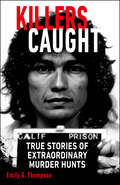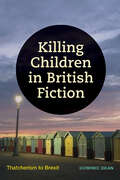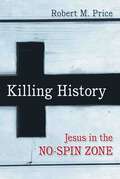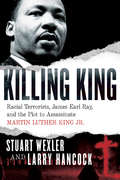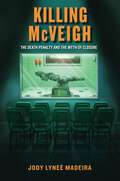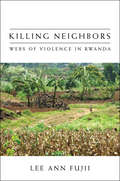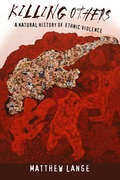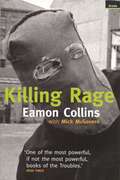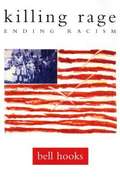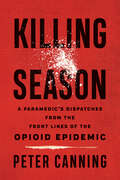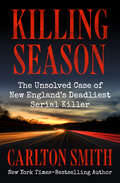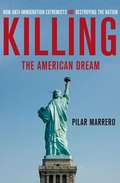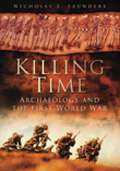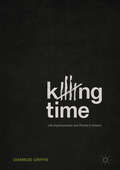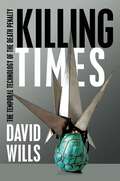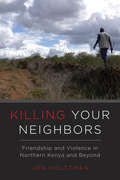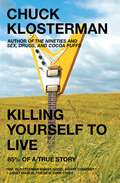- Table View
- List View
Killer Looks: The Forgotten History of Plastic Surgery in Prisons
by Zara StoneKiller Looks is the definitive story about the long-forgotten practice of providing free nose jobs, face-lifts, breast implants, and other physical alterations to prisoners, the idea being that by remodeling the face you remake the man. From the 1920s up to the mid-1990s, half a million prison inmates across America, Canada, and the U.K willingly went under the knife, their tab picked up by the government. In the beginning, this was a haphazard affair -- applied inconsistently and unfairly to inmates, but entering the 1960s, a movement to scientifically quantify the long-term effect of such programs took hold. And, strange as it may sound, the criminologists were right: recidivism rates plummeted. In 1967, a three-year cosmetic surgery program set on Rikers Island saw recidivism rates drop 36% for surgically altered offenders. The program, funded by a $240,000 grant from the Department of Health, Education, and Welfare, was led by Dr. Michael Lewin, who ran a similar program at Sing-Sing prison in 1953. Killer Looks draws on the intersectionality of socioeconomic success, racial bias, the prison industry complex and the fallacy of attractiveness to get to the heart of how appearance and societal approval creates self-worth, and uncovers deeper truths of beauty bias, inherited racism, effective recidivism programs, and inequality.,
Killer Weed
by Connie Carter Susan C. BoydSince the late 1990s, marijuana grow operations have been identified by media and others as a new and dangerous criminal activity of "epidemic" proportions. With Killer Weed, Susan C. Boyd and Connie Carter use their analysis of fifteen years of newspaper coverage to show how consensus about the dangerous people and practices associated with marijuana cultivation was created and disseminated by numerous spokespeople including police, RCMP, and the media in Canada. The authors focus on the context of media reports in Canada to show how claims about marijuana cultivation have intensified the perception that this activity poses "significant" dangers to public safety and thus is an appropriate target for Canada's war on drugs.Boyd and Carter carefully show how the media draw on the same spokespeople to tell the same story again and again, and how a limited number of messages has led to an expanding anti-drug campaign that uses not only police, but BC Hydro and local municipalities to crack down on drug production. Going beyond the newspapers, Killer Weed examines how legal, political, and civil initiatives that have emerged from the media narrative have troubling consequences for a shrinking Canadian civil society.
Killer on the Road: Violence and the American Interstate (Discovering America #2)
by Ginger StrandTrue crime meets cultural history in this story of how America&’s interstate highway system opened a world of mobility and opportunity . . .for serial killers.Starting in the 1950s, Americans eagerly built the planet&’s largest public work: the 42,795-mile National System of Interstate and Defense Highways. Before the concrete was dry on the new roads, however, a specter began haunting them: the highway killer. He went by many names: the &“Hitcher,&” the &“Freeway Killer,&” the &“Killer on the Road,&” the &“I-5 Strangler,&” and the &“Beltway Sniper.&” Some of these criminals were imagined, but many were real. The nation&’s murder rate shot up as its expressways were built. America became more violent and more mobile at the same time.Killer on the Road tells the entwined stories of America&’s highways and its highway killers. There&’s the hot-rodding juvenile delinquent who led the National Guard on a multistate manhunt; the wannabe highway patrolman who murdered hitchhiking coeds; the record promoter who preyed on &“ghetto kids&” in a city reshaped by freeways; the nondescript married man who stalked the interstates seeking women with car trouble; and the trucker who delivered death with his cargo. Thudding away behind these grisly crime sprees is the story of the interstates—how they were sold, how they were built, how they reshaped the nation—and how we came to equate them with violence.Through the stories of highway killers, we see how the &“killer on the road,&” like the train robber, the gangster, and the mobster, entered the cast of American outlaws, and how the freeway—conceived as a road to utopia—came to be feared as a highway to hell.&“Strand . . . Explores the connection between America&’s sprawling highway system and the pathology of the murderers who have made them a killing ground. . . . The grim stories of murder on the highway may do for road trips what Jaws did for surfing. An interesting detour into a true-crime niche.&” ―Kirkus Reviews&“Strand&’s cross-threaded tales of drifters, stranded motorists, and madmen got its hooks into me. Reading Ms. Strand&’s thoughtful book is like driving a Nash Rambler after midnight on a highway to hell.&” —Dwight Garner, The New York Times&“A titillating, clever volume that mixes the sweeping sociological assertions of an urban-studies textbook with the chilling gore of true-crime stories.&” —Bookforum&“Ginger Strand is in possession of a sharp eye, a biting wit, a beguiling sense of fun—and a magnificent obsession.&” —Bloomberg
Killer on the Road: Violence and the American Interstate (Discovering America #2)
by Ginger StrandStarting in the 1950s, Americans eagerly built the planet's largest public work: the 42,795-mile National System of Interstate and Defense Highways. Before the concrete was dry on the new roads, however, a specter began haunting them-the highway killer. He went by many names: the "Hitcher," the "Freeway Killer," the "Killer on the Road," the "I-5 Strangler," and the "Beltway Sniper. " Some of these criminals were imagined, but many were real. The nation's murder rate shot up as its expressways were built. America became more violent and more mobile at the same time. Killer on the Road tells the entwined stories of America's highways and its highway killers. There's the hot-rodding juvenile delinquent who led the National Guard on a multistate manhunt; the wannabe highway patrolman who murdered hitchhiking coeds; the record promoter who preyed on "ghetto kids" in a city reshaped by freeways; the nondescript married man who stalked the interstates seeking women with car trouble; and the trucker who delivered death with his cargo. Thudding away behind these grisly crime sprees is the story of the interstates-how they were sold, how they were built, how they reshaped the nation, and how we came to equate them with violence. Through the stories of highway killers, we see how the "killer on the road," like the train robber, the gangster, and the mobster, entered the cast of American outlaws, and how the freeway-conceived as a road to utopia-came to be feared as a highway to hell.
Killer: The Autobiography of a Mafia Hit Man (Adrenaline Classics Ser.)
by David Fisher Joey the Hit ManNew York Times Bestseller: This groundbreaking tell-all by a mob hit man is &“chilling and compelling—a must-read&” (Former FBI agent Joe Pistone, aka Donnie Brasco). The Bronx-born son of a Jewish bootlegger, &“Joey the Hit Man&” was introduced to crime when he was just eleven years old. For the next thirty years he was a numbers king, scalper, loan shark, enforcer, and drug smuggler. He hijacked trucks, fenced stolen goods, and trafficked in pornography. But Joey really made his name as a Mafia assassin, racking up thirty-eight cold-blooded hits—thirty-five for cash, three for revenge. In Killer, Joey tells the true story of life in organized crime. He exposes the reality of gang wars, discusses how he raised a family while living on the wrong side of the law, and documents the day-to-day business of crime—from making and breaking alliances to staying one step ahead of the cops. He reveals how he faced a grand jury seven times with no convictions (&“never lie to your lawyer&”) and kept a seven-figure fortune out of reach of the IRS. He lays out in graphic detail the difference between getting paid to kill and doing it for personal reasons. &“People think because they saw [The Godfather] they know everything there is to know about organized crime,&” Joey contends. In this no-holds-barred account, he reveals the brutal truth behind the Hollywood fantasy. Forty-five years after this true crime classic shocked readers all over the world and set the standard for bestselling Mafia biographies including Joseph Bonnano&’s A Man of Honor and Philip Carlo&’s Ice Man, the new edition of Killer includes an afterword by coauthor David Fisher that unmasks Joey&’s real identity—and the circumstances behind his death that add another layer of mystery to his complicated, colorful, and fascinating life.
Killers Caught: True Stories of Extraordinary Murder Hunts
by Emily G. ThompsonThey thought they had gotten away with murder. They were wrong.Discover the vital clues, the crucial evidence, the lucky breaks, the chases, the painstaking detective work, the unlikely heroes that led to the capture of serial killers such as &“The Good Nurse&” poisoner Charles Cullen, finally detected by a young colleague; Yorkshire Ripper Peter Sutcliffe, revealed by false license plates; Night Stalker Richard Ramirez, spotted by a 13-year-old boy; Hotelier of Death H. H. Holmes, apprehended selling his victims&’ skeletons…Killers Caught reveals the downfall of these ruthless individuals, as well as the stories of how many more of crime&’s most notorious and prolific murderers were brought to justice.
Killing Children in British Fiction: Thatcherism to Brexit
by Dominic DeanThis book stems from a simple yet disturbing observation: contemporary British fiction is full of children killing or being killed. Thoughtfully considering novels and films, alongside actual murder cases and moral panics, Dominic Dean develops this insight into a complex account of British cultural history, from the Thatcher to Brexit eras. Killing Children in British Fiction argues that the figure of the child provides means for negotiating, and hence for understanding, recent crises in Britain and their intersections with broader transnational conflicts. The book explores works from major British authors such as Kazuo Ishiguro, Ian McEwan, Doris Lessing, Sarah Waters, Alan Hollinghurst, and Peter Ackroyd; emerging writers such as David Szalay and Melissa Harrison; and filmmakers, including Stanley Kubrick, Nicholas Roeg, Robin Hardy, Derek Jarman, and Remi Weekes. Bridging and often challenging existing scholarship in childhood studies, literary studies, psychoanalysis, and critical and queer theory, Dean shows how the child, at once materially present and representative of an insecure future, can provoke relentless fantasies, fears, and, most troublingly, acts of real violence by adults.
Killing Civilization: A Reassessment of Early Urbanism and Its Consequences
by Justin JenningsThe concept of civilization has long been the basis for theories about how societies evolve. This provocative book challenges that concept. The author argues that a &“civilization bias&” shapes academic explanations of urbanization, colonization, state formation, and cultural horizons. Earlier theorists have criticized the concept, but according to Jennings the critics remain beholden to it as a way of making sense of a dizzying landscape of cultural variation. Relying on the idea of civilization, he suggests, holds back understanding of the development of complex societies.Killing Civilization uses case studies from across the modern and ancient world to develop a new model of incipient urbanism and its consequences, using excavation and survey data from Çatalhöyük, Cahokia, Harappa, Jenne-jeno, Tiahuanaco, and Monte Albán to create a more accurate picture of the turbulent social, political, and economic conditions in and around the earliest cities. The book will influence not just anthropology but all of the social sciences.
Killing History: Jesus In The No-Spin Zone
by Robert M. PriceKilling Jesus, the bestselling blockbuster by Bill O'Reilly, claims to be a purely historical account of the events in the life of Jesus leading up to his crucifixion. New Testament scholar Robert M. Price (a member of the Jesus Seminar) shows how unfounded this claim is in this critical review of O'Reilly's work. In fact, he judges the book to be the number one source of misinformation on Jesus today. Ignoring over one hundred years of New Testament scholarship, O'Reilly and his coauthor, Martin Dugard, have produced what Price describes as a Christian historical thriller that plays fast and loose with the facts. Price goes through the key events of Jesus' later life as described in the gospels and retold in Killing Jesus, painstakingly showing in each case what scholars know and don't know. Using humor, down-to-earth analogies, and witty sarcasm-not unlike O'Reilly's own interview style-Price makes it clear that O'Reilly's book is more historical novel than a work of serious history. By cobbling together the four gospel stories, ignoring the contradictions, and adding plenty of quasi-historical background embellishments, O'Reilly and Dugard have created a good narrative that resonates with a lot of Christians. Entertaining reading this may be, but history it is not. Killing History provides lay readers with an accessible introduction to New Testament scholarship while showing the many problems in O'Reilly's book.
Killing Kennedy: Exposing the Plot, the Cover-Up, and the Consequences
by Jack RothStartling new insights into the JFK assassination In Killing Kennedy: Exposing the Plot, the Cover-Up, and the Consequences, author Jack Roth interviews researchers, scholars, eyewitnesses, and family members of those who were part of the tangled web of US intelligence operations associated with the Cold War and the circumstances surrounding the assassination of John F. Kennedy. The author asks important questions, including why the assassination still matters today and what the lasting ripple effects have been since that fateful day. The Kennedy assassination represents one of the most impactful events in not only American but also world history, and this book represents an important addendum to understanding its enduring significance. On November 22, 1963, the duly elected president of the United States was murdered in cold blood, forever destroying &“Camelot&” and national optimism for world peace. Gleaning a &“people&’s history&” of the assassination through dozens of insightful and heartfelt interviews, Roth presents a riveting narrative by creating a respectful, well-crafted, and emotionally charged book from which both older and younger generations will gain a greater understanding of our nation&’s history and current status in the modern world.
Killing King: Racial Terrorists, James Earl Ray, and the Plot to Assassinate Martin Luther King Jr.
by Larry Hancock Stuart WexlerPublished in time for the 50th anniversary of Dr. Martin Luther King Jr.’s assassination, Killing King uncovers previously unknown FBI files and sources, as well as new forensics to convincingly make the case that King was assassinated by a long–simmering conspiracy orchestrated by the racial terrorists who were responsible for the Mississippi Burning murders. This explosive book details the long–simmering effort by a group of the nation’s most violent racial terrorists to kill Dr. Martin Luther King Jr. Killing King convincingly makes the case that while James Earl Ray was part of the assassination plot to kill King, the preponderance of evidence also demonstrates a clear and well–orchestrated conspiracy. Thoroughly researched and impeccably documented, the book reveals a network of racist militants led by Sam Bowers, head of the White Knights of the Ku Klux Klan of Mississippi, who were dedicated to the cause of killing King. The White Knights were formed in the cauldron of anti–integrationist resistance that was Mississippi in the early 1960s and were responsible for more than three hundred separate acts of violence, including the infamous Mississippi Burning murders. The authors have located previously unknown FBI files and sources that detail a White Knight bounty offer, information from an individual who carried money for the assassination, and forensics information regarding unmatched fingerprints and an audio recording of an admission that a key suspect obtained a weapon to be used in killing King. For years, Americans have debated issues with this crime. With Killing King, we are ever closer to an accurate understanding of how and why Dr. King was killed.
Killing McVeigh: The Death Penalty and the Myth of Closure
by Jody Lyneé MadeiraOn April 19, 1995, Timothy McVeigh detonated a two-ton truck bomb that felled the Alfred P. Murrah Federal Building in Oklahoma City, killing 168 people. On June 11, 2001, an unprecedented 242 witnesses watched him die by lethal injection.In the aftermath of the bombings, American public commentary almost immediately turned to “closure” rhetoric. Reporters and audiences alike speculated about whether victim’s family members and survivors could get closure from memorial services, funerals, legislation, monuments, trials, and executions. But what does “closure” really mean for those who survive—or lose loved ones in—traumatic acts? In the wake of such terrifying events, is closure a realistic or appropriate expectation?In Killing McVeigh, Jody Lyneé Madeira uses the Oklahoma City bombing as a case study to explore how family members and other survivors come to terms with mass murder. The book demonstrates the importance of understanding what closure really is before naively asserting it can or has been reached.
Killing Neighbors: Webs of Violence in Rwanda
by Lee Ann FujiiIn the horrific events of the mid-1990s in Rwanda, tens of thousands of Hutu killed their Tutsi friends, neighbors, even family members. That ghastly violence has overshadowed a fact almost as noteworthy: that hundreds of thousands of Hutu killed no one. In a transformative revisiting of the motives behind and specific contexts surrounding the Rwandan genocide, Lee Ann Fujii focuses on individual actions rather than sweeping categories. Fujii argues that ethnic hatred and fear do not satisfactorily explain the mobilization of Rwandans one against another. Extensive interviews in Rwandan prisons and two rural communities from the basics for her claim that mass participation in the genocide was not the result of ethnic antagonisms. Rather, the social context of action was critical. Book jacket.
Killing Others: A Natural History of Ethnic Violence
by Matthew LangeIn Killing Others, Matthew Lange explores why humans ruthlessly attack and kill people from other ethnic communities. Drawing on an array of cases from around the world and insight from a variety of disciplines, Lange provides a simple yet powerful explanation that pinpoints the influential role of modernity in the growing global prevalence of ethnic violence over the past two hundred years. He offers evidence that a modern ethnic mind-set is the ultimate and most influential cause of ethnic violence. Throughout most of human history, people perceived and valued small sets of known acquaintances and did not identify with ethnicities. Through education, state policy, and other means, modernity ultimately created broad ethnic consciousnesses that led to emotional prejudice, whereby people focus negative emotions on entire ethnic categories, and ethnic obligation, which pushes people to attack Others for the sake of their ethnicity. Modern social transformations also provided a variety of organizational resources that put these motives into action, thereby allowing ethnic violence to emerge as a modern menace. Yet modernity takes many forms and is not constant, and past trends in ethnic violence are presently transforming. Over the past seventy years, the earliest modernizers have transformed from champions of ethnic violence into leaders of intercommunal peace, and Killing Others offers evidence that the emergence of robust rights-based democracy—in combination with effective states and economic development—weakened the motives and resources that commonly promote ethnic violence.
Killing Rage
by Eamon Collins Mick McgovernSince the 1970s, people have been murdering their neighbors in Northern Ireland. This book is the true account of the small-town violence and terror which lies behind the headlines.
Killing Rage: Ending Racism
by Bell HooksOne of our country's premier cultural and social critics, Bell Hooks has always maintained that eradicating racism and eradicating sexism must go hand in hand. These twenty-three essays are written from a black and feminist perspective, and they tackle the bitter difficulties of racism by envisioning a world without it. They address a spectrum of topics having to do with race and racism in the United States: psychological trauma among African Americans; friendship between black women and white women; anti-Semitism and racism; and internalized racism in movies and the media. And in the title essay, Hooks writes about the "Killing Rage" -- the fierce anger of black people stung by repeated instances of everyday racism -- finding in that rage a healing source of love and strength and a catalyst for positive change.
Killing Season: A Paramedic's Dispatches from the Front Lines of the Opioid Epidemic
by Peter CanningA devastating, empathetic look at the opioid epidemic in the United States, through the eyes of a paramedic on the front lines.[I] set my cardiac monitor down by the young man's head. He is lifeless, his face white with a blue tinge. I apply the defibrillator pads to his hairless chest... A week from today, after the young man's brain shows no signs of electrical activity, the medical staff will take the breathing tube out, and with his family gathered by his side, he will pass away at the age of twenty-three. When Peter Canning started work as a paramedic on the streets of Hartford, Connecticut, twenty-five years ago, he believed drug users were victims only of their own character flaws. Although he took care of them, he did not care for them. But as the overdoses escalated, Canning began asking his patients how they had gotten started on their perilous journeys. And while no two tales were the same, their heartrending similarities changed Canning's view and moved him to educate himself about the science of addiction. Armed with that understanding, he began his fight against the stigmatization of users.In Killing Season, we ride along with Canning through the streets of Hartford as he tells stories of opioid overdose from a street-level vantage point. A first responder to hundreds of overdoses throughout the rise of America's epidemic, Canning has seen the impact of prescription painkillers, heroin, and the deadly synthetic opioid fentanyl firsthand. Bringing us into the room (or the car, or the portable toilet) with the victims of this epidemic, Canning explains how he came to favor harm reduction, which advocates for needle exchange, community naloxone, and safe-injection sites.Through the rapid-fire nature of one paramedic's view of addiction and overdose, readers will come to understand more than just the science and misguided policies behind the opioid epidemic. They'll also share in Canning's developing empathy. Stripping away the stigma of addiction through stories that are hard-hitting, poignant, sad, confessional, funny, and overall, human, Killing Season will change minds about the epidemic, help obliterate stigma, and save lives.
Killing Season: The Unsolved Case of New England's Deadliest Serial Killer
by Carlton SmithA New York Times–bestselling journalist traces a string of unsolved murders—and the botched investigation that let the New Bedford Highway Killer walk away. Over the course of seven months in 1988, eleven women disappeared off the streets of New Bedford, Massachusetts, a gloomy, drug-addled coastal town that was once the whaling capital of the world. Nine turned up dead. Two were never found. And the perpetrator remains unknown to this day. How could such a thing happen? How, in what was once one of America’s richest cities, could the authorities let their most vulnerable citizens down this badly? As Carlton Smith, a Pulitzer Prize finalist for his coverage of the Green River Killer case, demonstrates in this riveting account, it was the inability of police officers and politicians alike to set aside their personal agendas that let a psychopath off the hook. In Killing Season, Smith takes readers into a close-knit community of working-class men and women, an underworld of prostitution and drug abuse, and the halls of New England law enforcement to tell the story of an epic failure of justice.
Killing The American Dream: How Anti-immigration Extremists Are Destroying The Nation
by Pilar MarreroAs the US deports record numbers of illegal immigrants and local and state governments scramble to pass laws resembling dystopian police states where anyone can be questioned and neighbors are encouraged to report on one another, violent anti-immigration rhetoric is growing across the nation. Against this tide of hysteria, Pilar Marrero reveals how damaging this rise in malice toward immigrants is not only to the individuals, but to our country as a whole. Marrero explores the rise in hate groups and violence targeting the foreign-born from the 1986 Immigration Act to the increasing legislative madness of laws like Arizona's SB1070 which allows law officers to demand documentation from any individual with "reasonable suspicion" of citizenship, essentially encouraging states and municipalities to form their own self-contained nation-states devoid of immigrants. Assessing the current status quo of immigration, Marrero reveals the economic drain these ardent anti-immigration policies have as they deplete the nation of an educated work force, undermine efforts to stabilize tax bases and social security, and turn the American Dream from a time honored hallmark of the nation into an unattainable fantasy for all immigrants of the present and future.
Killing The SS: The Hunt for the Worst War Criminals in History (Bill O'Reilly's Killing Ser.)
by Bill O'Reilly Martin DugardConfronting Nazi evil is the subject of the latest installment in the mega-bestselling Killing series <P><P>As the true horrors of the Third Reich began to be exposed immediately after World War II, the Nazi war criminals who committed genocide went on the run. A few were swiftly caught, including the notorious SS leader, Heinrich Himmler. Others, however, evaded capture through a sophisticated Nazi organization designed to hide them. Among those war criminals were Josef Mengele, the “Angel of Death” who performed hideous medical experiments at Auschwitz; Martin Bormann, Hitler’s brutal personal secretary; Klaus Barbie, the cruel "Butcher of Lyon"; and perhaps the most awful Nazi of all: Adolf Eichmann. <P><P>Killing the SS is the epic saga of the espionage and daring waged by self-styled "Nazi hunters." This determined and disparate group included a French husband and wife team, an American lawyer who served in the army on D-Day, a German prosecutor who had signed an oath to the Nazi Party, Israeli Mossad agents, and a death camp survivor. Over decades, these men and women scoured the world, tracking down the SS fugitives and bringing them to justice, which often meant death. <P><P>Written in the fast-paced style of the Killing series, Killing the SS will educate and stun the reader. <P><P>The final chapter is truly shocking.
Killing Time: Archaeology and the First World War
by Nicholas J SaundersThe passage of time has all but extinguished any living memory of the Great War of 1914-1918 but the experiences of those who fought in the trenches of the Somme and Flanders have since become epic history and the stuff of legend. Today, hardly a month passes without some dramatic and sometimes tragic discovery being made along the old killing fields of the Western Front. Graves of British soldiers buried during battle - still lying in rows seemingly arm in arm or found crouching at the entrance to a dugout; whole 'underground cities' of trenches, dugouts and shelters have been preserved in the mud; field hospitals carved out of the chalk country of the Somme marked with graffiti; unexploded bombs and gas canisters - all of tehse are the poignant and sometimes deadly legacies fo a war we can never forget. Killing Time digs beneath the surface of war to uncover the living reality left behind. Archaeologist and anthropologist Nicholas J Saunders brings together a wealth of discoveries in family photographs, diaries, souvenirs and in the trenches to offer fresh insights into the human dimension of warfare in the contemporary past.
Killing Time: Life Imprisonment And Parole In Ireland
by Diarmuid GriffinLittle is known about life imprisonment and the process of releasing offenders back into the community in Ireland. Addressing this scarcity of information, Griffin’s empirical study examines the legal and policy framework surrounding life imprisonment and parole. Through an analysis of the rationales expressed by parole decision-makers in the exercise of their discretionary power of release, it is revealed that decision-makers view public protection as central to the process. However, the risk of reoffending features amidst an array of other factors that also influence parole outcomes including personal interpretations of the purposes of punishment, public opinion and the political landscape within which parole operates. The findings of this study are employed to provide a rationale for the upward trend in time served by life sentence prisoners prior to release in recent times. With reform of parole now on the political agenda, will a more formal process of release operate to constrain the increase in time served witnessed over the last number of decades or will the upward trajectory continue unabated?
Killing Times: The Temporal Technology of the Death Penalty
by David WillsKilling Times begins with the deceptively simple observation—made by Jacques Derrida in his seminars on the topic—that the death penalty mechanically interrupts mortal time by preempting the typical mortal experience of not knowing at what precise moment we will die. Through a broader examination of what constitutes mortal temporality, David Wills proposes that the so-called machinery of death summoned by the death penalty works by exploiting, or perverting, the machinery of time that is already attached to human existence. Time, Wills argues, functions for us in general as a prosthetic technology, but the application of the death penalty represents a new level of prosthetic intervention into what constitutes the human.Killing Times traces the logic of the death penalty across a range of sites. Starting with the legal cases whereby American courts have struggled to articulate what methods of execution constitute “cruel and unusual punishment,” Wills goes on to show the ways that technologies of death have themselves evolved in conjunction with ideas of cruelty and instantaneity, from the development of the guillotine and the trap door for hanging, through the firing squad and the electric chair, through today’s controversies surrounding lethal injection. Responding to the legal system’s repeated recourse to storytelling—prosecutors’ and politicians’ endless recounting of the horrors of crimes—Wills gives a careful eye to the narrative, even fictive spaces that surround crime and punishment.Many of the controversies surrounding capital punishment, Wills argues, revolve around the complex temporality of the death penalty: how its instant works in conjunction with forms of suspension, or extension of time; how its seeming correlation between egregious crime and painless execution is complicated by a number of different discourses. By pinpointing the temporal technology that marks the death penalty, Wills is able to show capital punishment’s expansive reach, tracing the ways it has come to govern not only executions within the judicial system, but also the opposed but linked categories of the suicide bombing and drone warfare. In discussing the temporal technology of death, Wills elaborates the workings both of the terrorist who produces a simultaneity of crime and “punishment” that bypasses judicial process, and of the security state, in whose remote-control killings the time-space coordinates of “justice” are compressed and at the same time disappear into the black hole of secrecy.Grounded in a deep ethical and political commitment to death penalty abolition, Wills’s engaging and powerfully argued book pushes the question of capital punishment beyond the confines of legal argument to show how the technology of capital punishment defines and appropriates the instant of death and reconfigures the whole of human mortality.
Killing Your Neighbors: Friendship and Violence in Northern Kenya and Beyond
by Jon HoltzmanNeighboring communities who once lived together in peace have committed some of the most disturbing genocidal violence in recent decades: ethnic cleansing in the former Yugoslavia; the slaughter of Tutsis in Rwanda; or Sunni-versus-Shia violence in today's Iraq. As these instances illustrate, lethal violence does not always come at the hands of outsiders or foreigners--it can come just as easily from someone who was once considered a friend. Employing a multisited, multivocal approach to ethnography, Killing Your Neighbors examines how peaceful neighbors become involved in lethal violence. It engages with a set of interlocking case studies in northern Kenya, focusing on sometimes-peaceful, sometimes violent interactions between Samburu herders and neighboring groups, interweaving Samburu narratives of key violent events with the narratives of neighboring groups on the other side of the same encounters. The book is, on one hand, an ethnography of particular people in a particular place, vividly portraying the complex and confusing dynamics of interethnic violence through the lives, words and intimate experiences of individuals variously involved in and affected by these conflicts. At the same time, the book aims to use this particular case study to illustrate how the dynamics in northern Kenya provides comparative insights to well-known, compelling contexts of violence around the globe.
Killing Yourself to Live: 85% of a True Story
by Chuck KlostermanBuilding on the national bestselling success of Sex, Drugs, and Cocoa Puffs, preeminent pop culture writer Chuck Klosterman unleashes his best book yet--the story of his cross-country tour of sites where rock stars have died and his search for love, excitement, and the meaning of death.For 6,557 miles, Chuck Klosterman thought about dying. He drove a rental car from New York to Rhode Island to Georgia to Mississippi to Iowa to Minneapolis to Fargo to Seattle, and he chased death and rock 'n' roll all the way. Within the span of twenty-one days, Chuck had three relationships end--one by choice, one by chance, and one by exhaustion. He snorted cocaine in a graveyard. He walked a half-mile through a bean field. A man in Dickinson, North Dakota, explained to him why we have fewer windmills than we used to. He listened to the KISS solo albums and the Rod Stewart box set. At one point, poisonous snakes became involved. The road is hard. From the Chelsea Hotel to the swampland where Lynyrd Skynyrd's plane went down to the site where Kurt Cobain blew his head off, Chuck explored every brand of rock star demise. He wanted to know why the greatest career move any musician can make is to stop breathing...and what this means for the rest of us.




